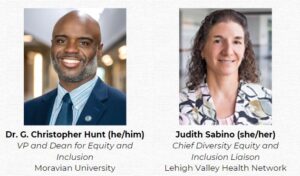
LINC is working to collectively promote a diverse, equitable, and inclusive Lehigh Valley. Our DEI Council is made up of regional leaders, working together to support Lehigh Valley employers in advancing and sustaining their DEI Initiatives. For our next feature, we connected with Dr. G. Christopher Hunt of Moravian University and Judy Sabino, of Lehigh Valley Health Network. Dr. Hunt and Judy with us about their experience in DEI and his motivations to serve on LINC’s DEI Council
Here is what they had to say:
Why did you want to serve on the DEI Council?
Hunt: Like many opportunities that we eventually become involved with, serving on the DEI Council was presented to me by my friend, Scott Blair. I have known about the great work LINC has done in this region to promote diversity, equity, and inclusion, so when someone that I highly respect, such as Scott, suggested I consider becoming more involved, I quickly paid attention.
Sabino: A former Lehigh Valley Health Network colleague invited me to join the council when she transitioned to a new professional role. I fondly remember my first meeting and being excited to be part of a group of very passionate DEI leaders committed to collectively advancing equity and inclusion within LINC and other workplaces across the Lehigh Valley. I believe that learning and innovation occur in community, and it is an honor to be a part of this council to collaboratively support workplaces in which all colleagues feel a sense of value and belonging.
Why is DEI important to you?
Hunt: What is known today as “diversity, equity, and inclusion” was known when I went to college as “multicultural affairs.” But the work to support historically underrepresented and marginalized individuals and to promote diversity to all people has been referred to by many terms. Unfortunately, some of those terms are not particularly flattering in our increasingly polarized society. At the end of the day, DEI is important to me because it calls on all of us to respect and acknowledge the humanity of each individual.
Sabino: Bart Bailey, a well-known DEI consultant in the Lehigh Valley, once said that our “biases prevent [us] from appreciating someone else’s humanity.” This statement epitomizes why I am sincerely passionate about advancing DEI in professional interactions and organizations. Unlike other social settings where we can choose with whom we interact, workplaces are venues in which we encounter and interact with others with a variety of backgrounds, experiences, and perspectives. Successful organizations leverage this rich variation to innovate, grow and successfully respond to challenges. To do so, however, requires leaders and employees to be aware of historical and structural inequities, understand and mitigate the negative consequences of conscious and unconscious biases and foster humble, safe, and respectful connections for all. For me, this is “human work” as well as a calling and I am honored to have the opportunity to do serve in this capacity at LVHN and in the Lehigh Valley.
What brought you to the Lehigh Valley?
Hunt: After being born and spending my first couple of years in New York State, my parents moved here in the early 1980s, so I have been in this region for most of my life, so “ABE” has personal meaning to me. My father was a pastor in downtown Allentown before he passed in 1990, and my mom retired after teaching for over 30 years at Paxinosa Elementary School in Easton. I grew up in Bethlehem and graduated from Liberty High School.
Sabino: I came to the Lehigh Valley as a young child when my father got a job at Mack Trucks. It has been a wonderful place to grow up, have a professional career and raise my own family.
What’s one of the Lehigh Valley’s best-kept secrets?
Hunt: Newer residents of the area should know that the Lehigh Valley has a total population of just over 860,000 residents as of the 2020 U.S. census, which makes it the third-largest metropolitan area in the state and the 68th largest statistical area in the country.
Sabino: The Lehigh Valley is filled with many beautiful parks and recreation areas. I enjoy the parks in my community and visiting larger parks, such as Allentown’s Rose Garden and Trexler Park.
What has been your proudest moment working on issues of diversity, equity, and inclusion?
Hunt: My proudest moment working on issues of diversity, equity, and inclusion is seeing the community come together to support the Black and Latino Male College Readiness Program of the Lehigh Valley at Moravian University. We are now into our second year of facilitating an initiative to bring rising 10th, 11th, and 12th graders to campus for several days in the summer as well as local Black and Latino male leaders from across the region for mentorship, guidance, and college preparatory discussions.
Sabino: It was very rewarding to collaborate with colleagues on LVHN’s Actions Against Racism and Advancing Equity Council to establish 3 Colleagues Aligned as Resources for Engagement and Support (CARES) Groups (African American, Black, and Caribbean CARES, Asian/South Asian CARES and Todos Unidos (Hispanic/Latinx) CARES). The colleagues who have joined these groups have expressed joy and gratitude for the opportunity to gather and get to know others with whom they share an identity, celebrate observances, and develop professionally in their network roles.
What is one piece of advice you have for leaders of companies just getting started on their DEI journey?
Hunt: If you think you learned about the history of diversity in the United States, go back and either relearn or unlearn what you thought you learned.
Sabino: There are so many ways to get started on a DEI journey and I think the most important is to understand and clearly state “your why” or the reason for advancing DEI. With this stated purpose, the strategies to reach anticipated goals emerge, alignment with organizational goals is evident, and the challenges can be addressed.
Thank you, Dr. Hunt and Judy, for sharing your story!